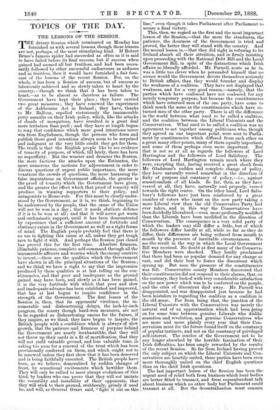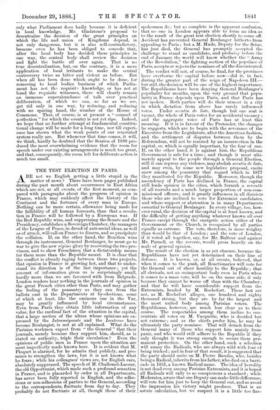TOPICS OF THE DAY.
THE LESSONS OF THE SESSION.
THE dreary Session which terminated on Monday has furnished us with several lessons, though these lessons are not, perhaps, of the most stimulating kind. If Robert Bruce's famous spider had succeeded as often as it is said to have failed before its final success, but if success when gained had seemed all but fruitless, and had been neces- sarily followed by other successful endeavours as arduous and as fruitless, then it would have furnished a fair fore- cast of the lessons of the recent Session. For, on the whole, it has been a Session of success, but of success so laboriously achieved and so slowly taken to heart by the country,—though we think that it has been taken to heart,—as to be almost as cheerless as failure. The Government have kept their place ; they have carried two great measures ; they have renewed the experiment of the Ashbourne Act in Ireland ; they have, thanks to Mr. Balfour, repelled victoriously the innumerable petty assaults on their Irish policy, which, like the attacks of clouds of mosquitoes, have resulted in a great deal more irritation than peril • and they have at length begun to reap that confidence which mere good intentions never win from Englishmen, though the persons who form and publish those good. intentions always seem to be surprised and indignant at the very little credit they get for them. The truth is that the English people like to see evidence of tenacity of purpose, of which, till lately, there has been no superfluity. But the wearier and drearier the Session, the more factious the attacks upon the Estimates, the more numerous the motions for adjournment in order to discuss questions of urgent public importance, the more vexatious the crowds of questions, the more harassing the false imputations on Government officials, the greater is the proof of tenacity which the Government have given, and the greater the effect which that proof of tenacity will produce in winning supporters to their policy, and antagonists to Home-rule. For this must be clearly under- stood by the Government, as it is, we think, beginning to be understood by the people, that the cause of the -Union will not be won in a day ; that it needs obstinate defence if it is to be won at all ; and that it will never get warm and enthusiastic support, until it has been demonstrated by experience that a sufficient amount of fortitude and obstinacy exists in the Government as well as a right frame of mind. The English people probably feel that there is no use in fighting this cause at all, unless they get tough men to fight it with. And perhaps the Session just closed has proved this for the first time. Absolute firmness, illimitable patience, complete self-command through all the innumerable affronts and worries which the enemy contrive to invent,—these are the qualities which the Government have shown in all the principal situations of the Session ; and we think we have a right to say that the impression produced by these qualities is at last telling on the con- stituencies, and that poor and inadequate as the ground gained may have been, and slowly as it has been gained, it is the very fortitude with which that poor and slow and inadequate advance has been established and improved, that has at last begun to inspire confidence in the strength of the Government. The first lesson of the Session is, then, that its opponents' virulence, the in- numerable and disheartening delays, the inch-by-inch progress, the scanty though hard-won measures, are not to be regarded as disheartening omens for the future, if they inspire, as we think they have begun to inspire, the British people with a confidence which is always of slow growth, that the patience and firmness of purpose behind the Government are nearly inexhaustible, that they will not throw up their cards in a fit of mortification, that they will not yield valuable ground, and lose valuable time, in asking too soon for a renewal of the trust which has been provisionally conferred on them, and which ought not to be renewed unless they first show that it has been deserved and is being faithfully executed. The British people have been, as we believe, demoralised by sudden changes of front, by sensational excitements which bewilder them. They will only be rallied to meet abrupt evolutions of this kind, by leaders who can prove that they will not imitate the versatility and instability of their opponents, that they will stick to their ground, stubbornly, grimly if need be, and will, as General Grant said, "fight it out on this line," even though it takes Parliament after Parliament to secure a final victory.
This, then, we regard as the first and the most important lesson of the Session,—that the more the steadiness, the patience, the dourness of the Government is tried and proved, the better they will stand with the country. And the second lesson is,—that they did right in refusing to let Ireland absorb all their attention, and in firmly insisting upon proceeding with the National Debt Bill and the Local Government Bill, in spite of the distractions which Irish affairs so liberally afforded. Mr. Parnell, acute as he is, was a little too clever when he persuaded himself that no sooner would the Government devote themselves seriously to British affairs, than they would founder and display the weakness of a coalition. They have not displayed that weakness, and for a very good reason,—namely, that the parties which have coalesced have not coalesced for any merely temporary purpose, but because the constituencies which have returned men of the one party, have come to think much the same as the constituencies which have re- turned men of the other party. There is all the difference in the world between what used to be called a coalition, and the coalition between the Liberal Unionists and the Conservatives. What used to be called a coalition was an agreement to act together among politicians who, though they agreed on one important point, were sent to Parlia- ment by constituencies which differed from each other on a great many other points, many of them equally important, and some of them perhaps even more important. But that is not so at all as regards the followers of Lord Hartington and the followers of Lord Salisbury. The followers of Lord Hartington remain much where they were, excepting that, having received a great shock from Mr. Gladstone's sudden and complete change of policy, they have naturally veered somewhat in the direction of fixity of purpose and constancy of policy,—i.e., against sensationalism of all kinds. So far, then, as they have veered at all, they have, naturally and properly, veered towards the right centre. On the bther hand, Lord Salis- bury's followers have just been reinforced by a great number of voters who insist on the new party taking a more Liberal view than the old Conservative Party had ever taken, and in this way the Conservatives have been decidedly liberalised,—even more profoundly modified than the Liberals have been modified in the direction of Conservatism. The consequence is a very solid party of which the leaders may still differ a little, but of which the followers differ hardly at all, while so far as they do differ, their differences are being reduced from month to month by the pressure of inevitable circumstances. We see the result in the way in which the Local Government Bill was received. No doubt at first many of the Conserva- tive Members were shocked. They loudly proclaimed that there had been no popular demand for any change so vast, and did their best to foster the discontent which sprang up. But soon the pressure of the constituencies was felt. Conservative county Members discovered that their constituencies did not respond to their alarms, that, on the contrary, they looked with very considerable satisfaction on the new power which was to be conferred on the people, and the cries of discontent died away. Mr. Parnell was disappointed, and was disappointed just because he had been mistaken in regarding the coalition as a coalition in the old sense. Far from being that, the junction of the Liberal Unionists with the Conservatives was merely the natural end of an approximation which had been going on for some time between genuine Liberals who dislike sensation and revolution, and genuine Conservatives who see more and more plainly every year that their Con- servatism must for the future found itself on the constancy of popular instincts, and not on the constancy of privileged self-interest. The resolve of the Government not to be any longer absorbed by the horrible fascination of their_ Irish difficulties, has been amply rewarded by the results of the recent Session. So far from Ireland having proved the only subject on which the Liberal Unionists and Con- servatives are heartily united, these parties have been even more thoroughly united on the chief English questions than on the chief Irish questions.
The last important lesson of the Session has been the urgent need of relief both from business which local bodies are better fitted to transact, and from superabundant talk about business which no other body but Parliament could transact at all. But the decentralisation must concern only what Parliament does badly because it is deficient in local knowledge. Mr. Gladstone's proposal to decentralise the decision of the great principles on which the life and union of Kingdoms depend, is not only dangerous, but it is also self-contradictory, because even he has been obliged to concede that, after the local body has decided these principles in one way, the central body shall review the decision and fight the battle all over again. That is no true decentralisation, but, on the contrary, it is a mere application of local irritants to make the central controversy twice as bitter and violent as before. But when all has been done which ought to be done, for removing to local bodies business of which Parlia- ment has not the requisite knowledge, or has not at hand the requisite witnesses, there will clearly remain an immense superabundance of talk over practical deliberation, of which we can, so far as we see, get rid only in one way, by reducing, and reducing with no sparing hand, the number of the House of Commons. That, of course, is at present a "counsel of perfection" for which the country is not yet ripe. Indeed, we hope that no further attempt at fundamental constitu- tional change will be made for a long time, nor till experi- ence has shown what the weak points of our renovated system really are. But whenever that time comes, it will, we think, hardly be doubted that the Session of 1888 pro- duced the most overwhelming evidence that the room for speech under our existing arrangements is much too great, and that, consequently, the room left for deliberate action is much too small.



































 Previous page
Previous page